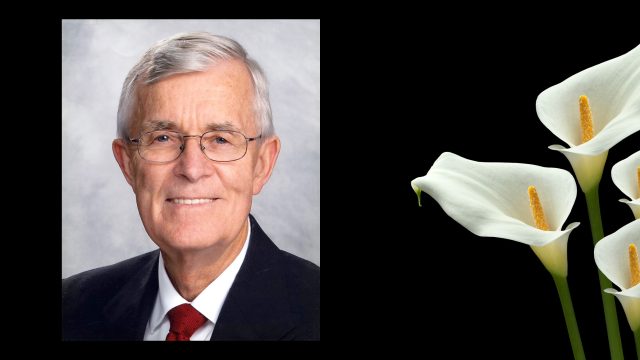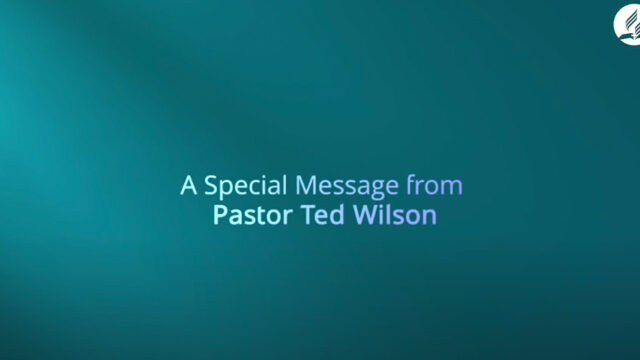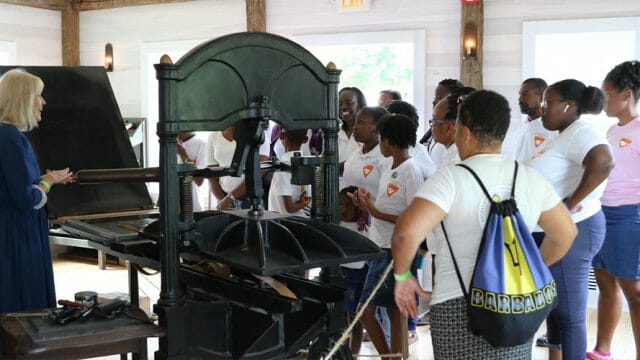The school is looking for and finding ways to extend its mission in the digital age.
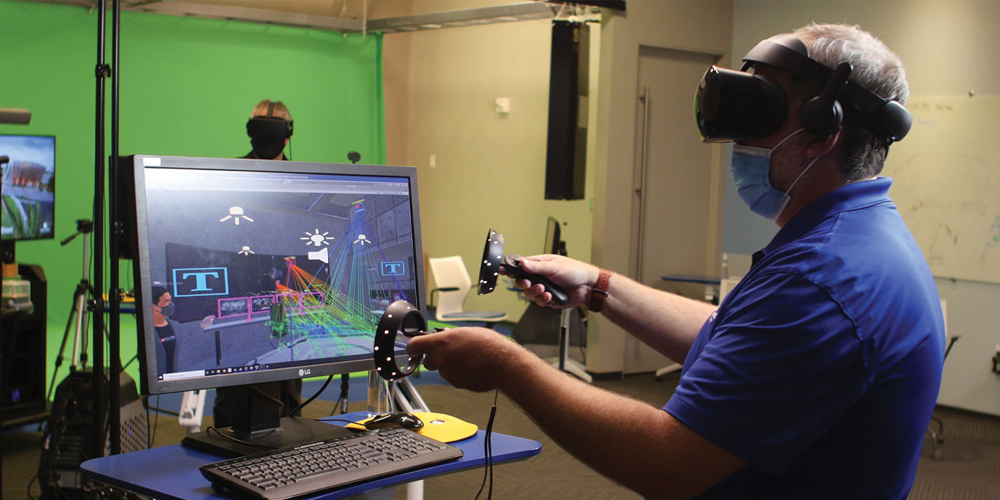
AdventHealth University (AHU) students prepare for careers in health, science, academia, and leadership. Early in 2020, faculty leaders in Orlando and Denver quickly innovated teaching for online platforms and adapted to new rules imposed by the COVID-19 pandemic. Support teams ensured that labs, simulation clinics, and digital technologies were up to the challenge, and during the worst health crisis in 100 years, the university’s enrollment increased.
On the heels of 2020, AHU is poised for a new era of innovation and strategic growth. “The people of AHU are all heroes in my book,” Edwin Hernández, AHU president, said. “Our amazing faculty kept our virtual doors open, embraced new technologies, counseled students through fear and uncertainty, innovated safe clinical education, and ensured that a fresh crop of graduates was ready to enter the workforce on time, with excellent skills, uncommon compassion, and an intense desire to serve.”
Since its inception, the school has been guided by biblical principles informed by its Seventh-day Adventist heritage, an honored and essential component of its mission, vision, and values. AHU extends the healing ministry of Christ by transforming students through the power of faith-based education.
“The unique AIIM learning model at AHU — active, innovative, interprofessional, missional — has served our students especially well throughout 2020,” Hernández said. “AHU’s AIIM education equips learners for the realities of modern health care, which encompasses scientific and academic research; lifelong learning in the classroom, lab, and clinical settings; and top-quality care that connects physical, mental, emotional, and spiritual well-being.”
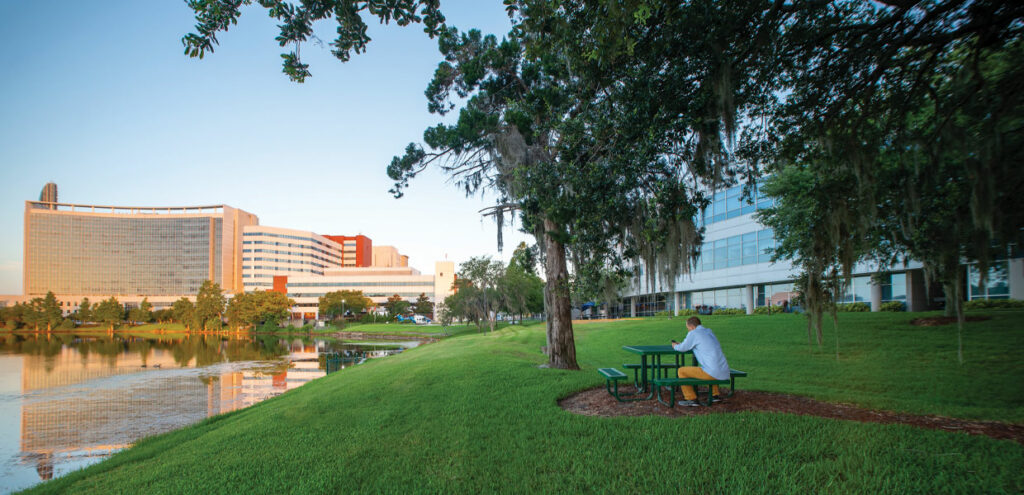
This triad of research, education, and health care is a “time-honored tradition in academic medical centers and the Adventist faith tradition worldwide,” according to Hernández. At AdventHealth and AHU, the health system’s national university, the triad may also hold the formula for future insight and innovation in whole-person care, the promise of AdventHealth as advanced by Adventists 150 years ago.
“AHU is a foundational institution in AdventHealth’s journey to become a dynamic learning community. As we look boldly toward the future of health care, our aspiration is to build AHU into a national asset that will train a significant portion of our clinical workforce in the delivery of whole-person care — body, mind, and spirit,” Terry Shaw, president and CEO for AdventHealth, said. “When we treat people, we want to treat them from a whole-person perspective.”
With this shared commitment, both institutions are positioned to develop the research, training, and curricula to better prepare professionals to provide whole-person care.
A Community that Connects, Supports, and Equips
At AHU, a story is often retold about the difference between U.S. and Australian farmers’ approach to livestock in their care. U.S. farmers build fences to contain livestock, defining boundaries of ownership. In Australia, where farms (called stations) are much larger and fencing costs prohibitive, farmers contain animals by digging a well. The water, essential to survival, keeps livestock voluntarily close and within safe boundaries.
AHU culture reflects the well as a metaphor for its Christo-centric worldview: “And I, when I am lifted up from the earth, will draw all people to myself” (John 12:32, NIV). By welcoming students of all backgrounds and beliefs, all three AHU campuses — Orlando, Denver, and Online — are safe places where all can choose to strengthen their relationship with God. That “well” — one’s personal relationship with God — draws students to AHU, keeps them close, and then sends them into the world fortified with a deep and abiding faith.
Savanah Watson, an AHU Denver student, testified that her time at AHU was the driving force behind her decision to be baptized into the Adventist faith in November 2020. “At AHU, I felt welcomed, seen, heard, and loved,” Watson said. “I became part of a community that was unlike anything I had ever experienced. My professors believed in me, and they helped me build my relationship with God and my confidence. My life will never be the same.”
“My vision for AHU is grounded in collaborative and integrative research, the source of new human knowledge, insight, and understanding in this amazing world we share,” Hernández said. “Alongside the brilliant minds at AdventHealth, AHU scholars, and academic research partners are embarking on a journey to uncover the still-unsolved mysteries of faith and healing, prayer and wellness, spiritual practice, and human flourishing.”
This research agenda could chart new pathways in the education of whole-person care professionals. Whole-person care, Hernández said, extends to the entire health-care operation, including the discovery of new treatments, cures, and preventative vaccines, and the essential education of current and future health-care professionals.
“Once in a century is humanity faced with a global health crisis,” Hernández said, “one that calls on us to expand our knowledge of science and medicine. I believe we are called as believers to rise to the challenge before us and to fulfill our God-given purpose to extend Christ’s healing ministry.”
Carla G. Park, executive director of faith community strategy at AdventHealth and AHU assistant to the president for mission, frames whole-person care as the foundation of teaching and learning at AHU, including theological understanding, personal wholeness, skill building, research endeavors, and strategic vision. “Faith is not simply an extra thing we do; it is the foundation upon which we build an ethic of wonder, curiosity, and compassion,” Park said. “We encourage personal wholeness, in ourselves and in our students.”
In addition to advancing this research agenda, AHU is deeply committed to ensuring equitable access to education, opportunity, and purpose-driven careers. Hernández cited projected workforce shortages in health care, particularly in nursing and primary-care physicians, as a potential crisis that must be prevented, beginning in 2021.
Key to preventing future gaps in the health-care workforce, according to Hernández, is expanding the education net to include more people with the potential, sense of purpose, and passion required for demanding health-care, research, and academic professions.
To continue to support students, address impending workforce needs, and meet growing student demand, AHU has introduced new clinical degree tracks, an evening nursing program in Orlando, and a new master of science degree in spiritual care. But for many students, the challenge of funding their education persists. AdventHealth and AHU are exploring new avenues to make school more affordable for all students, particularly those with high potential and financial need. Geographic scholarship funds, innovative employment/education models, and employer-sponsored tuition are all under investigation.
Another key to preventing a health-care workforce crisis: online education. Since 2001, AHU has been an early adopter, leader, and innovator in online learning. AHU’s e-learning includes its 100-percent virtual option, AHU Online, which offers seven degrees, including four master’s programs.
“With online access, all students who feel called to health care have access to AHU’s mission-focused education, no matter the physical distance,” Deena Slockett, chief operations officer for AHU Online, said.
University leaders stress that online learning is not only consistent with traditional Christian learning; it can sometimes provide a safer space for students to explore their faith. “The importance of our work in health care requires connecting students to our mission,” Slockett said. “AHU provides virtual forums, community worship services, and prayer gatherings to support spiritual growth in addition to professional growth.”
Additionally, support services are entirely online, delivered by chaplains, coaches, and counselors, whose concern for students encompasses their academic, mental, emotional, spiritual, physical, and financial well-being. Counseling, tutoring, writing support, academic guidance, and coaching are created to provide a high-quality, personalized, and mission-centric focus to AHU’s online communities.
Transforming the Science and Practice of Whole-Person Care
As education and technology continue to evolve, AHU puts innovation at the forefront of its vision. On that front, the team behind AHU’s Immersive Technologies Lab (ITL) is critical to AHU’s growth. Focused on virtual reality (VR), augmented reality (AR), and 360-degree video projects, the ITL team initially created deliverables for the university to supplement in-person education and explore solutions to unique challenges in health care.
Founded by Dan Lim, vice president of educational technology and innovation, the ITL has exploded with growth in recent years. Projects range from equipment training to a recent award-winning project designed to help hospitals plan resource allocation and distribution amid the pandemic. Developed in partnership with Full Sail University, the project leveraged one of many new relationships AHU has developed in this space.
A whole-person-care research project currently underway in partnership with ITL is using advanced learning technologies to train key components of whole-person care, including empathy and compassion. Video simulations based on AHU’s chaplain rounding projects for graduate students give more students access to this invaluable spiritual experience in a virtual learning environment. Now going into year two of the study, Lim reported receiving positive feedback already. One nursing student said that after experiencing the immersive chaplain rounding, she “finally understood the difference between sympathy and empathy.”
Another breakthrough came with an invitation to meet with Apple executives in Cupertino to explore a partnership piloting iPad Pro tablets as a learning tool. Key professionals from AdventHealth and AHU traveled to California to learn how online learning, research, assignments, labs, and assessments could be integrated on one device able to deliver AR content. With the support of nursing faculty leaders and a generous private donor who expressed enthusiasm about the innovative project, Lim’s team is preparing to launch the pilot with nursing programs in Orlando and Denver.
“If the entire student learning experience is seamlessly executed on a single mobile device and confirmed by data, it could change the way we prepare health-care professionals for seamless patient care and great customer service in the health-care marketplace,” Lim said. If the pilot groups are successful, they could serve as a foundation for expanding the program in the future.
Because of its core mission and aspirational vision to transform the science and practice of whole-person care, AHU is committed to strengthening efforts to innovate in e-learning and other educational technology. AHU leaders embrace and explore all new initiatives with the intent to improve health-care teaching and learning, expand scientific and academic inquiry, and develop influential leaders of uncommon compassion who will advance the healing ministry of Christ.
“We’re not afraid of the future; we are embracing this moment of change as a brilliant opportunity,” Hernández said. “The future of health care and education demands a culture of learning, a hunger for excellence, and innovative leaders fearlessly committed to serving God’s healing mission.”
The original version of this story was posted on Southern Tidings.


